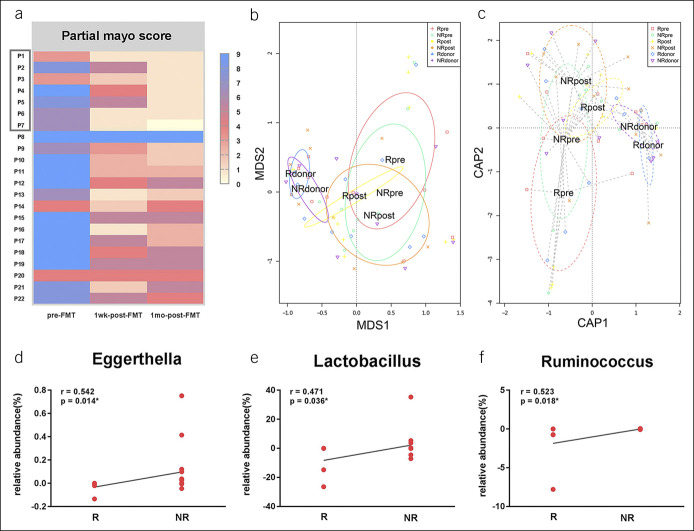Figure 6.
Microbiota related to the long-term efficacy of FMT in patients with UC. (a) The partial Mayo score of the 22 patients at various visits (pre-FMT, 1 week post-FMT and 1 month post-FMT). The 7 patients (boxed) achieved clinical remission and maintaining time was at least 4 months. (b and c) Beta diversity was calculated by MDS and CAP coordinates in the remission (R) and nonremission (NR) groups. Each dot stands for 1 sample. (d–f) The relative abundance differences of genera Eggerthella (r = 0.542, P = 0.014), Lactobacillus (r = 0.471, P = 0.036), and Ruminococcus (r = 0.523, P = 0.018) between pre-FMT and 5 days post-FMT were positively correlated to the long-term efficacy (4 months after FMT) significantly. P value less than 0.05 was considered statistically significant. The number of samples: Rdonor (n = 7), NRdonor (n = 12), Rpre (n = 7), NRpre (n = 15), Rpost (n = 5), and NRpost (n = 15). CAP, canonical analysis of principal; FMT, fecal microbiota transplantation; NRpre, genera in the nonremission group before FMT; NRpost, genera in the nonremission group after FMT; Rdonor, genera in the remission group of donor; Rpre, relative abundance of genera in the remission group before FMT; Rpost, genera in the remission group after FMT; MDS, multidimensional scaling; NRdonor, genera in the nonremission group of donor; UC, ulcerative colitis.

